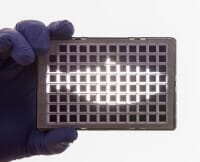 The milestone achievement will dramatically increase the accuracy of identifying Atlantic salmon for selective breeding, creating a natural shortcut in producing future generations more resistant to disease.
The milestone achievement will dramatically increase the accuracy of identifying Atlantic salmon for selective breeding, creating a natural shortcut in producing future generations more resistant to disease.
Salmon egg producers worldwide will now have access to a scientific tool to customise breeding programmes and develop healthier and robust strains of salmon in a naturally sustainable way while reducing the use of therapeutic chemicals.
The development is detailed in a scientific paper published in BMC Genomics- see http://www.biomedcentral.com/1471-2164/15/90
The work was carried out by scientists at leading aquaculture genetics company Landcatch, the University of Edinburgh’s Roslin Institute and Royal (Dick) School of Veterinary Studies, Edinburgh Genomics; the Institute of Aquaculture, at Stirling University; University of Glasgow and genomics analysis company Affymetrix UK Ltd.
It centres on the development of a SNP Chip for Atlantic salmon, which is a cutting-edge genomic selection tool that will allow scientists to take the next step in predicting which fish have the best performance by looking at their individual DNA sequence.
SNP Chips are glass slides used to analyse variations in DNA sequences, or Single Nucleotide Polymorphisms (SNPs), which act as biological markers and help scientists locate a range of genes associated with disease resistance and other traits.
Genomic selection using SNP Chips is already routinely applied in crops, cattle, pigs and chickens but Landcatch is the first company to apply the technique to salmon.
Until now studies on the genetic make-up of salmon and efforts to improve the accuracy of selection in breeding programmes have been hampered by the relatively small number of markers that could be investigated to identify certain traits in individual fish.
Previous SNP arrays containing less than 10,000 polymorphic SNPs are now considered too inaccurate for population-level applications of genomics.
However the recent breakthrough developed the first high-density SNP genotyping array for Atlantic salmon. There are millions of markers in every species, and these can be used as milestones on the DNA map. Scientists, who previously worked with single genes using a handful of markers, can now interrogate hundreds of thousands of markers to look at 20,000-30,000 genes in salmon.
The technology means Landcatch geneticists are now able to get a much more detailed, digital-quality description of the genetics of individual fish.
Dr Alan Tinch, director of genetics at Landcatch, said: “This development takes selective breeding programmes to a whole new level. It is an extension to the selective breeding of salmon allowing more accurate identification of the best fish to create healthier and more robust offspring.
“We have now achieved a strategic goal in salmon breeding. We have a far clearer picture of how individual fish will perform in our customers’ farms.”
It is another landmark for Landcatch, which in 2007 was the first aquaculture company to pinpoint a gene controlling resistance to Infectious Pancreatic Necrosis (IPN), which poses a major threat to Atlantic salmon.
The company later also proved that sea lice resistance is inherited, subsequently producing juvenile fish, which were less susceptible to sea lice.
Landcatch supplies genetic services and Atlantic salmon eggs and smolts to the aquaculture industry globally from breeding programmes in Scotland and Chile. It uses selective breeding to develop strains of salmon which can perform to ever higher levels at every stage of production from eggs to adult fish.
The firm is part of the global Hendrix Genetics multi-species food production organisation whose mission is to help the world meet its food needs through innovative and sustainable genetic techniques.



